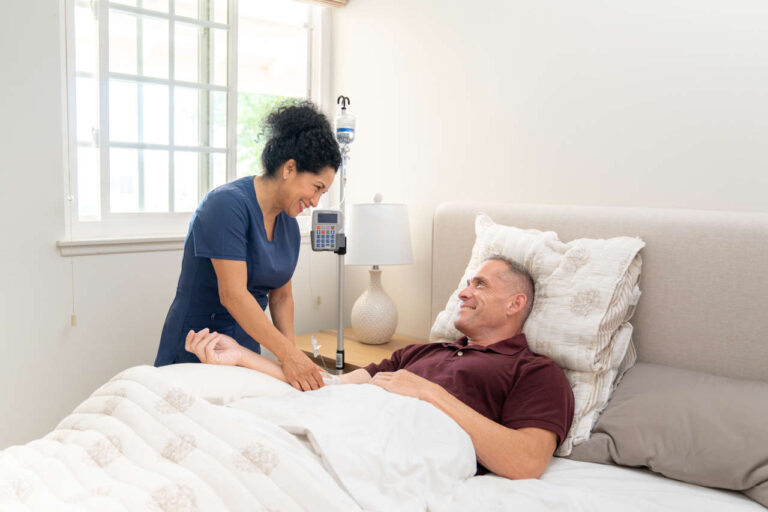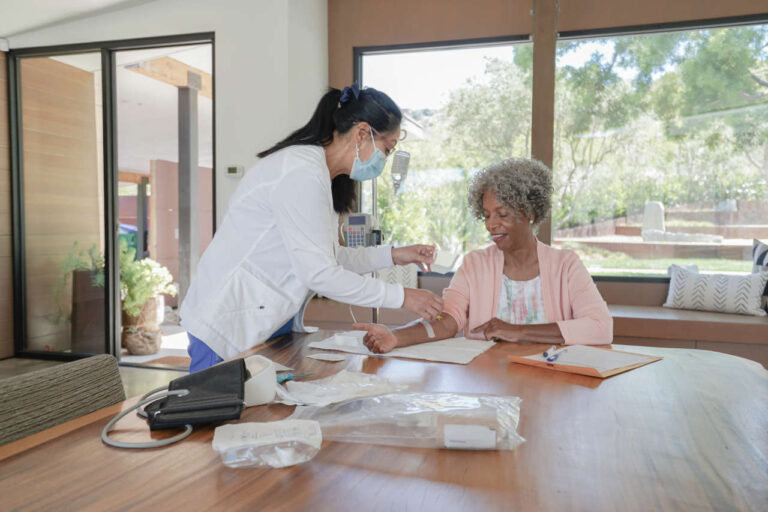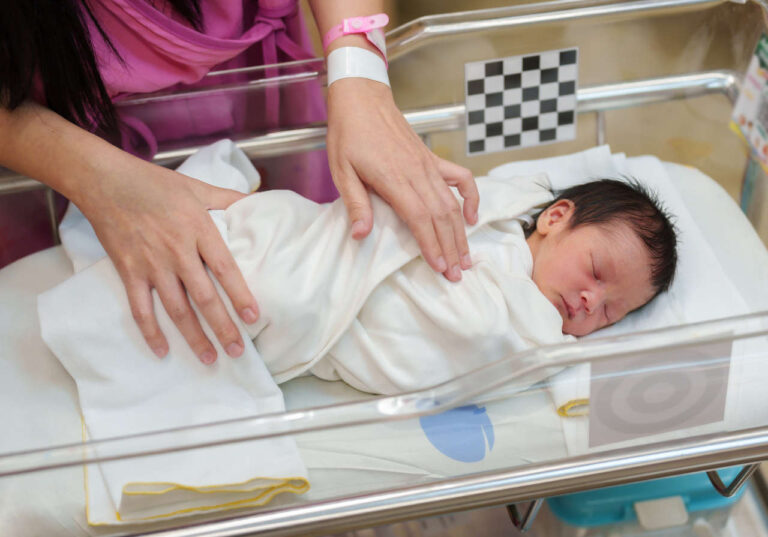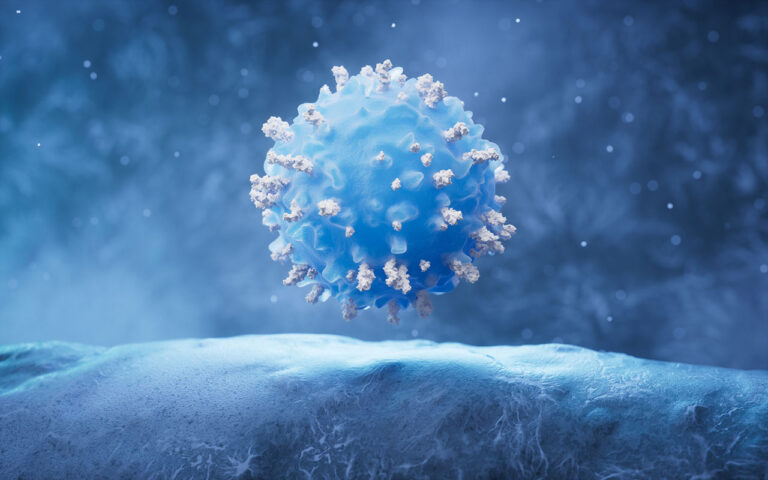
Varios informes de casos han demostrado que La terapia con IgIV se puede utilizar como tratamiento de segunda línea en pacientes con síndrome de Churg-Strauss grave.
¿Puede ayudar la IgIV? | Información gratuita sobre el tratamiento con IgIV
El síndrome de Churg-Strauss, o SCS, es un trastorno autoinmune e inflamatorio poco común que causa inflamación de los vasos sanguíneos pequeños (vasculitis), afectando especialmente a los del sistema respiratorio. La inflamación o hinchazón de los vasos sanguíneos restringe el flujo sanguíneo a los pulmones, lo que a menudo provoca asma, sinusitis y daño orgánico permanente en casos graves.
Para tratar el síndrome de Churg-Strauss se utilizan tratamientos estándar, como corticosteroides o cirugía. Sin embargo, en algunos casos, Terapia con IgIV Se recomienda como tratamiento de segunda línea cuando las terapias convencionales no son suficientes.
Este artículo analiza los aspectos básicos del síndrome de Churg-Strauss, cómo puede ayudar la IgIV y qué esperar si usted o su ser querido están considerando la IgIV para el síndrome de Churg-Strauss.
Síndrome de Churg-Strauss: una breve descripción general
En 2010, los expertos médicos cambiaron el nombre del síndrome de Churg-Strauss a granulomatosis eosinofílica con poliangeítis (EGPA) para reflejar las tres características principales de la enfermedad:
- Eosinófilo:Acumulación excesiva de eosinófilos (un tipo de glóbulo blanco) que provoca inflamación y daño tisular.
- Granulomatosis:Formación de granulomas (grupos de células inmunes) en los tejidos afectados como respuesta a la inflamación.
- Poliangeítis:Inflamación que afecta a múltiples vasos sanguíneos en todo el cuerpo.
Por lo tanto, la EGPA es una afección que se caracteriza por una acumulación excesiva de eosinófilos, la formación de granulomas y la inflamación de múltiples vasos sanguíneos. Estos factores, en conjunto, provocan síntomas y daño tisular en los órganos afectados, como los pulmones, la piel y los nervios.
La EGPA es más común en personas que tienen asma o antecedentes de alergias.
Habla con un especialista
Acerca de la asistencia para copagos¿Cómo puede la IgIV ayudar a los pacientes con síndrome de Churg-Strauss (CSS)?
Varios casos informes han demostrado que Terapia con IgIV Puede tratar eficazmente a pacientes con SCS cuando otros tratamientos estándar no dan resultados prometedores. Dado que el SCS forma parte de un grupo de enfermedades autoinmunes en las que el sistema inmunitario hiperactivo ataca erróneamente al organismo, la IgIV puede ayudar a modular el sistema inmunitario y evitar que ataque al organismo.
Si bien el mecanismo de funcionamiento exacto de la IgIV no está claro, los investigadores creen que Tratamiento con IgIV Ejerce una amplia gama de efectos para mejorar la calidad de vida de los pacientes con SCS. Por ejemplo, la IgIV puede:
1. Suprimir la inflamación
Se sabe que la terapia con IgIV tiene propiedades antiinflamatorias. Puede ayudar a reducir la inflamación de los vasos sanguíneos y, con el tiempo, reducir el riesgo de daño orgánico grave.
2. Neutralizar los autoanticuerpos
La IgIV también ayuda a neutralizar o bloquear la actividad de los autoanticuerpos. Los autoanticuerpos son proteínas anormales que atacan las células sanas. Uno de estos anticuerpos, llamado ANCA, está presente en algunas personas con EGPA, aunque no en todas. Solo aproximadamente el 40% de los pacientes con EGPA lo presentan.
3. Reducir los niveles de eosinófilos en sangre
Los eosinófilos son un tipo de célula inmunitaria que interviene en una respuesta alérgica o una infección. En pacientes con SCS, el nivel de eosinófilos suele ser el doble de lo normal. Esto provoca la acumulación de estas células en tejidos como los pulmones, la piel, el corazón o los nervios, lo que causa inflamación y daño tisular.
En pacientes con CSS, la IgIV ayuda reducir el nivel de eosinófilos en la sangreLo hace bloqueando la actividad de los eosinófilos, lo que previene su acumulación excesiva en los tejidos.
¿Cómo se administra IgIV a pacientes con síndrome de Churg-Strauss?

La IgIV se administra mediante infusión intravenosa (IV) en un hospital o en el domicilio. Este proceso dura varias horas y puede requerir varias sesiones, dependiendo de la respuesta del paciente con SCS y la gravedad de los síntomas.
Después del tratamiento con IgIV, puede experimentar dolores de cabeza, fatiga, síntomas parecidos a los de la gripe o reacciones alérgicas.
¿Quién puede recibir terapia con IgIV?
No todos los pacientes con síndrome de Stevens-Johnson pueden recibir terapia con IgIV. Generalmente se considera para:
- Pacientes que mostraron una respuesta deficiente a los tratamientos estándar de CSS
- Pacientes con función inmunológica comprometida (que tienen mayor riesgo de desarrollar infecciones secundarias a los medicamentos inmunosupresores estándar)
- Pacientes con recaídas o afectación orgánica grave
La mejor infusión de IgIV en casa
¿Qué tan efectiva es la IgIV para pacientes con síndrome de Churg-Strauss (CSS)?
Actualmente, solo unos pocos estudios han reportado los efectos beneficiosos de la IgIV en pacientes con SCS. Según los resultados de estos estudios, la IgIV se considera un tratamiento de segunda línea eficaz para el SCS cuando las terapias convencionales son insuficientes.
Por ejemplo, una estudio doble ciego controlado con placebo demostró que la terapia con IgIV mejoró los síntomas de vasculitis y normalizó el recuento de eosinófilos en pacientes con CSS grave.
De manera similar, otro informe de caso demostró que la terapia con IgIV mejora el flujo sanguíneo a los nervios cuando se administra en combinación con ciclofosfamida A un paciente con síndrome de Stevens-Johnson (SCS) y neuropatía grave. Las tres sesiones de terapia con IgIV redujeron el nivel de eosinófilos, y los niveles séricos de ANCA antimieloperoxidasa disminuyeron a valores normales. Por lo tanto, la terapia con IgIV puede considerarse un tratamiento de segunda línea. para pacientes con CSS cuando los tratamientos estándar no dan resultados prometedores.
REFERENCIAS:
- Tsurikisawa, N., Taniguchi, M., Saito, H., Himeno, H., Ishibashi, A., Suzuki, S. y Akiyama, K. (2003). Tratamiento del síndrome de Churg-Strauss con dosis altas de inmunoglobulina intravenosa. Anales de alergia, asma e inmunología, 92(1), 80-87. https://doi.org/10.1016/S1081-1206(10)61714-0
- Tsurikisawa, N., Saito, H., Oshikata, C., Tsuburai, T. y Akiyama, K. (2014). Terapia con inmunoglobulina intravenosa de dosis alta para la granulomatosis eosinofílica con poliangeítis. Alergia clínica y traslacional, 4(1). https://doi.org/10.1186/2045-7022-4-38
- Umeda, A., Yamane, T., Takeuchi, J., Imai, Y., Suzuki, K. y Yumura, W. (2014). Mejora notable de la neuropatía del síndrome de Churg-Strauss mediante inmunoglobulina intravenosa y ciclofosfamida. Informes de casos de respirología, 2(2), 81-84. https://doi.org/10.1002/rcr2.56
- Taniguchi, M., Tsurikisawa, N., Higashi, N., Saito, H., Mita, H., Mori, A., Sakakibara, H. y Akiyama, K. (2006). Tratamiento del síndrome de Churg-Strauss: inducción de la remisión y eficacia de la terapia con inmunoglobulina intravenosa. Alergología Internacional, 56(2), 97-103. https://doi.org/10.2332/allergolint.R-07-142
- Nakamura, M., Yabe, I., Yaguchi, H., Kishimoto, R., Mito, Y., Fujiki, N., Houzen, H., Tsuji-Akimoto, S., Niino, M. y Sasaki, H. (2009). Caracterización clínica y tratamiento exitoso de 6 pacientes con neuropatía asociada al síndrome de Churg-Strauss. Neurología Clínica y Neurocirugía, 111(8), 683-687. https://doi.org/10.1016/j.clineuro.2009.07.004













